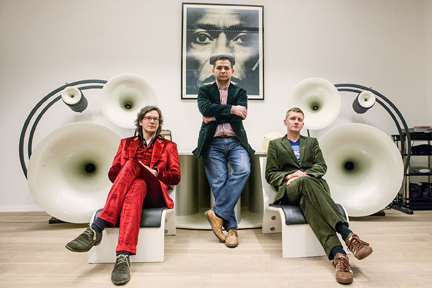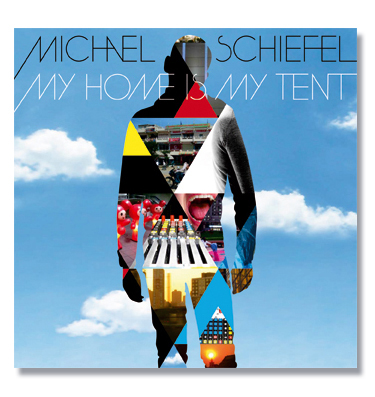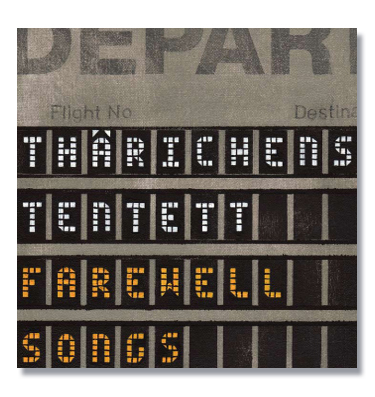::: News
Out now:
Wood & Steel Trio feat. Michael Schiefel
Hollywood Songbook

“I literally wrote a ‘Hollywood Songbook’ back then, meaning I wrote at least one song almost everyday - sometimes more. Either to a text by Brecht or to Hölderlin or other things like Pascal for example. And I wrote onto a big folder: ‘Hollywood Songbook’ or ‘Hollywood Diary’, I don’t remember, and I said: This is my pastime; this is what I do beside work.”
Hanns Eisler, April 13th 1958, from: “Gespräche mit Hans Bunge - Fragen Sie mehr über Brecht.”
This pastime of the great German composer did indeed stay in the drawer for a long time even after Eisler’s return from the U.S.A. Despite their striking quality and intensity, to this day the songs are little known and seldom played. The Classical pianist Eric Schneider recorded an album of them with the singer Matthias Goerne in 1998 in an art song aesthetic. A while later Schneider and Michael Schiefel devoted themselves to the pieces, only for private pleasure however. Thereafter, the repertoire was in the back of Schiefel’s mind for a long time. “The challenge was that Eisler had devised the music delicate and complex like a tightrope act. You can’t play around or experiment with it, without damaging it,” the singer explains. Eventually the solution was finding a new instrumentation instead of changing the notation. “I suggested the idea to the Wood & Steel Trio and they were enthusiastic about taking on the piano part,” Schiefel remembers. Shortly afterwards they got the offer of the Jazzfest Berlin to present their version of the Hollywood Songbook live.
“Besides the powerful lyrics, the wide range of the musical language and the condensed substance of the individual songs fascinated us,” Marc Muellbauer describes the impressions that Eisler’s music had on the Wood & Steel Trio. With double bass, the steely, acoustic Dobro guitar, a metallically shimmering vibraphone or the warm timbre of the wooden marimba, the band creates completely new orchestrations of the songs, but practically didn’t change any notes from the original.
It is not known which style of playing Eisler had in mind for his Hollywood Songbook. Especially considering that he himself quite blithely juggled with styles and deliberately did not submit to the standards that tormented him during his commissioned work as film composer. “I imagined that this eclectic songbook was a way to an inner balance for Eisler,” Schiefel says. The idea of not setting a stylistic frame while composing certainly seems more up to date than ever to the variable singer.
Michael Schiefel sings Eisler’s song cycle in his individual, multifarious manner, with which he has been attracting attention outside of the jazz-scene as well in the last few years.
“Songs like ‘Der Kirschdieb’ [The Cherry Thief] and ‘Der Schatzgräber’ [The Treasure Seeker] are composed with functional harmony and fairly easy to grasp,” Schiefel outlines the repertoire. “‘Vom Sprengen des Gartens’ [On The Sprinkling of Gardens] could be from the 19th century, ‘Schatzgräber’, with poetry by Goethe, may be even older. ‘In den Weiden’ [In the Pastures], ‘Frühling’ [Spring] and ‘Der Sohn’ [The Son] however clearly reference the 20th century. Their strong tonal leaps are not really atonal, but sometimes move into unexpected directions and are very challenging to sing.” The same goes for “Nightmare”, which is full of contrasts whereas “An den kleinen Radioapparat” veils its melancholic disquiet in a deceptively beautiful melody.
When listening to Eisler’s exile music today or to the texts Bertolt Brecht wrote when he was fleeing and in the U.S., one can’t help but think of present-day refugee dramas. “Brecht’s language has haiku-like conciseness; there is not a word to much,” Marc Muellbauer states, “At the same time the poems are snapshots that, due to their intimacy, have something universal. They describe the small things and thereby let the horrors they arose from become relentlessly apparent. In the light of current refugee situations, these 70-year-old songs once again read completely and shockingly differently.”
Michael Schiefel and the Wood & Steel Trio do more than justice to the depth and complexity of Eisler’s Hollywood Songbook. They sensitively create highly nuanced and intense interpretations and respectfully transcend the spirit of the originals in individual new variations that last longer than the moment. Maybe someday in the distant future there won’t have to be any more fleeing, but even then these songs will still be deeply touching.
Michael Schiefel - Platypus Trio"

New solo album

Michael Schiefel
MY HOME IS MY TENT
TRAUMTON 4539-2
Release May 7, 2010
Michael Schiefel is a riveting, hugely talented singer on the thriving Berlin
jazz scene. In solo and group formats, he has released 12 albums over the
past decade, each one winning more praise than the one before. Particularly
in solo performance, he augments his distinctive, virtuoso voice with experimental
loops and other effects to achieve extraordinary expressions of passion,
joy, and alienation.
Michael's latest album - My Home is My Tent - is about travel: traveling
between cities, between cultures, between musical genres. Released by Traumton
Records
in May 2010, My Home is My Tent is an intensely personal reflection on the
frenetic pace and jarring discontinuities of a life spent on the road.
It is a fine follow-up to highly praised albums such as his 2007 Don't Touch
My Animals, on which, wrote Jazzthing, "his vocal range traverses a
variety of moods and personae, from melancholic to euphoric and from crooner
to diva".
Michael Schiefel's apprenticeship in Berlin clubs in the early 1990s after
the Wall fell, as the city flourished with a new cultural sense of possibilities,
has reaped huge artistic rewards for him. Reviewers and fans sing his praises
for the way that, chameleon-like, he inhabits varied songs in idiosyncratic
styles. "Germany has never seen a singer like Michael Schiefel before," Sueddeutsche
Zeitung said last year of Schiefel, who in 2001, at the age of 31, became
a professor of vocal jazz at the Franz Liszt Conservatory in Weimar—and
the youngest music professor in Germany. He has proved himself as "one
of the few German jazz musicians who possesses a truly original style" (German
Jazz Encyclopedia, 2005), whether performing solo or in a Duo with pianist
Carsten Daerr; with the funk-pop band JazzIndeed; with the classical-inspired
big band, Thaerichen's Tentett; with the Balkan-beat German-Bulgarian quintet
Batoru; or with modern jazz stalwart David Friedman.
New Single (digital only)

Michael Schiefel
BOYS DON'T CRY
TRAUMTON 4546-2
Release May 21, 2010
Boy's don't cry
New album with Thärichens Tentett

Thärichens Tentett
FAREWELL SONGS
Traumton 4528-2
Thärichen’s Tentett - Farewell Songs
This year, Thärichens Tentett is celebrating its tenth anniversary! In the past ten years, Thärichens Tentett has been lauded as the band that delivers “the most felicitous compositions, the most polished arrangements, and the most humorous presentation of all larger German jazz groups” (Süddeutsche Zeitung). And the major newspaper Frankfurter Allgemeine Zeitung said about vocalist Michael Schiefel: "Germany has perhaps never had such a jazz singer." Audiences, too, have become more and more enthusiastic during the years that spanned from the publication of the tentet’s first album Lady Moon to their third record Grateful, from their first performance at the A-Trane (Berlin) in 1999 to their 2009 concerts in China. Now, ten years after its inception, Thärichens Tentett is publishing the fourth album: Farewell Songs. Is Thärichens Tentett saying goodbye?
There is no need to worry, Nicolai Thärichen und his tentet are doing just fine. The music might have become more mature, but it is no less freaky. Thärichens Tentett faces the serious side of life with a good deal of irony. While Sven Klammer’s flugelhorn mourningly bids a last farewell to the lightheartedness of adolescence in “The last day of my youth,” Kai Brückner’s guitar quickly brings back the olden days with full force in Thärichen’s virtuoso cover-arrangement of AC/DC’s “Up to my neck in you.”
In “On being a woman,” composed on a poem by Dorothy Parker, the tentet mockingly muses about the eternal difficulty of having to decide between two choices. When I am in Rome, I want to go home; when I am at home, I want to go to Rome. Michael Schiefel rises to the occasion with flying colors; he cuts loose with a scat improvisation, not a conventional jazzy one, but with the voice of an overblown opera singer. Saying goodbye with Thärichens Tentett can actually be lots of fun. Especially when Ronald D. Laing’s acerbity gets its turn („Unadored“). If your partner treats you like dirt, why not leave him or her with words such as: “It’s none to soon / for a new spittoon / and something else to shit in”? Add a funky 7/4 groove, and off you go, slamming the door in a dancing step.
Yet, Thärichen’s music is also influenced by the critical moments in life he has recently experienced. The threepart „Farewell Suite” is dedicated to his father, who passed a short time ago - composer, author and solo timpanist of many years with the Berlin Philharmonic Orchestra, Werner Thärichen (1921-2008). But how do you put a farewell to your father into music? Nicolai Thärichen’s musical mourning covers an entire spectrum of feelings: The suite strides from grief and pain (“Waltz for my Father”) to a questioning halt and introspection (“Strange Bells”), and finds in the song “If” a conciliatory end with Robert Creeley’s succinct lines: “...you’ve had the world, such as you got. / There’s nothing more, there never was.”
The peacefully flowing ballad “This Time” is about love, eventually. For once, even about a happy one, and quite unexpectedly so. This is also a theme of this very personal record: Some feelings can only be understood with time.
The Farewell Songs by Thärichens Tentett sound as worldly-wise as they do profound, are both deadly serious and completely far-out. They are about losing and finding – and about the fact that you seldom get one without the other.
Latest Solo CD

Michael Schiefel
DON'T TOUCH MY ANIMALS
ACT 9711-2
In the beginning there was courage. Michael Schiefel wanted to sing; yet he did not feel moved to travel down the jazz tradition's well-trodden paths. Sure, he would need to acquire a solid training in vocal technique, which he did as a student at Germany's top-notch University of the Arts (UdK) in Berlin. He would need to pay his dues, which he did during Berlin's cultural awakening, playing with small bands in the city's clubs in the early nineties. The rest of it though, was open, was his to shape. Schiefel began to experiment, listening to Bobby McFerrin, who showed him that an artist doesn't necessarily need a band to convince an audience. And he discovered a technical toy, a loop-machine that enabled him to reproduce his voice live in real time. The soloist developed into an orchestra, linear melodies grew into playful three-dimensional vocal architecture. A sonic window of opportunity here, some musical stairs and a hidden emergency exit there; something that would be a way out, back to the root of it all, his singing.
This was the state of affairs in the mid nineties. Schiefel dared to dive in at the deep end, and started a solo career with "Invisible Loop" (1998) and "I Don't Belong" (2000). Reviewers and audiences were similarly thrilled. They admired his ability to transform himself musically, to change into different characters. They praised his timbre, the precision in his intonation, stylistic flexibility, and were fascinated by his very personal celebration of creativity, and a wealth of ideas that seemed without par in his country. "A star is born" one broadsheet proclaimed, and this summarized the mood in the scene. Schiefel himself was a lot more matter of fact; he felt he still had a lot to learn, despite his success. Furthermore, the Berlin scene was beginning to sparkle, and was producing more and more interesting projects. Thus the soloist was soon joined by the team player who explored his funky roots with jazzIndeed, celebrated intellectual inspiration with Thärichens Tentett, cultivated the ballad in his own trio formation, and played classical modern jazz with David Friedman.
What had been a well-kept secret became common knowledge, even part of the establishment. In 2001 Schiefel became a professor at the "Franz Liszt Conservatory Of Music" in Weimar. The just turned thirty-one year old was suddenly in a position to pass on the results of his creative process to his students. With "Gay" (2003) he featured his trio on an album of love songs. Two years later, he and the quintet jazzIndeed dedicated themselves to the repertoire of New German Wave with "Blaue Augen" (ACT 9651-2). As his calendar started filling up more and more, the Goethe-Institute sent him around the world as a cultural ambassador. Not least due to his vocal and interpretative talent, Thärichens Tentett developed into an in-demand festival act. In the meantime, he continued writing, working on and trying out his solo repertoire.
Technology finally provided further momentum. An update of his beloved loop-machine
was released, providing new possibilities of acoustic collage. New repertoire
had accumulated, and thus Michael Schiefel went into the studio once more
to continue his vocal research with "Don't Touch My Animals". Some
of the songs are German, some English; they recount stories of love and the
tangle of relationships, fabricate surreal sketches of city life or reflect
ironically on Germany's inherent contradictions. All the beats, sounds and
melodies are vocal, and come together to construct a brilliant patchwork
of pop/jazz moods and rhythms.
RALF DOMBROWSKI.

 Info.pdf
Info.pdf